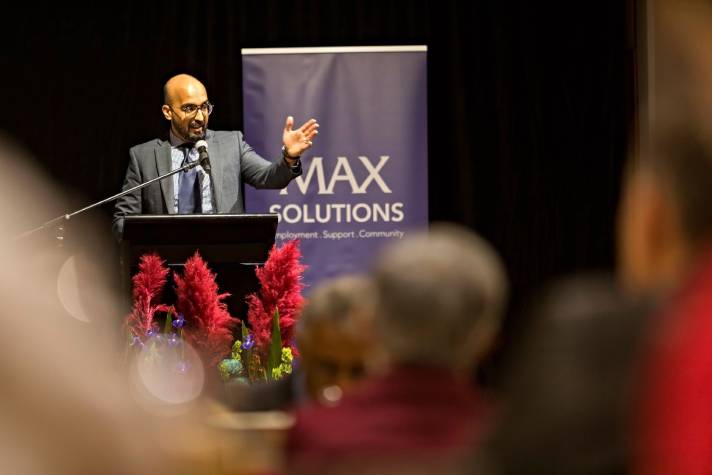Ramadan 2020
Published by MAXSolutions on April 21, 2020

Image: MAX Business Intelligence Analyst, Adnan Zakir speaking at the 2019 Logan iftar event, hosted by MAX Solutions. Communities from across southern Brisbane came together to enjoy an iftar celebration meal together.
Thursday 23 April marks the beginning of the month of Ramadan, which will end on Saturday 23 May.
COVID-19 is changing the way we live in so many aspects of our lives, and the Muslim observance of Ramadan in 2020 will be no exception.
Typical Ramadan
Ramadan remembers the month the Qur'an (the Muslim holy book) was first revealed to the Prophet Muhammad (PBUH).
During the month, Muslims:
- Fast during daylight hours - it is common to have one meal (known as the suhoor), just before sunrise and another (known as the iftar), directly after sunset. The iftar is often celebrated in extended family and friendship groups.
- Try to give up bad habits - it is a time for prayer and good deeds and to spend time with family and friends and help people in need.
- Give to charity – abstaining from food and water during daylight hours sees Muslims particularly empathise with those living in poverty and in turn, charity is a big part of Ramadan.
- Many will attempt to read the whole of the Qur'an at least once during Ramadan. They may also attend special services at mosques in which the Qur'an is read aloud.
MAX Business Intelligence Analyst, Adnan Zakir shares how he and his family observe Ramadan.
“Ramadan is a time of celebration and joy, to be spent with loved ones. My family and I wake up well before dawn to eat the first meal of the day, which has to last us until sunset. Normally, it’s breakfast with high protein food, and we drink lots of water right up until dawn, after which you can't eat or drink anything. At dawn, we perform the morning prayer. I normally stay up and read the Qur'an before it’s time to get ready for work,” says Mr Zakir.
“Muslims are not supposed to avoid work or any other normal duties during the day just because they are fasting. So, it’s business as usual for me. When the evening call to prayer is made (at sunset), we normally break our fast with dates, say our evening prayers, and then the family have dinner. I prefer a light dinner as right after sunset, I rush to the mosque for special prayer which goes for about two hours,” he says.
Like many religious and cultural celebrations, Ramadan typically revolves around socialising, enjoying meals with friends and family and group gatherings.
The end of Ramadan is marked by a big celebration called Eid ul-Fitr.
“At the end of Ramadan there’s a big three-day celebration called Eid al-Fitr, or the Festival of the Breaking of the Fast. It's kind of like the Muslim version of Christmas, in the sense that it's a day where everyone comes together for big meals with family and friends, exchanges presents, and generally has a lovely time,” says Mr Zakir.
Mosques hold special services and a special meal is eaten during the daytime (the first daytime meal for a month).
Ramadan in 2020
This year, social distancing regulations will see the social gathering aspects of Ramadan look markedly different.
Muslims will undoubtedly feel the absence of physical presence and community during this time.
“This year, with isolation in place, and mosques being closed, it would be hard to enjoy the true essence of Ramadan. Something that I know I will truly miss,” says Mr Zakir.
“Instead of going to the mosque, my family will be spending more time at home performing extra prayers and reading the Qur'an, similar what we used to do at mosques, but now we will be doing the same at home.
“We will try to still connect with friends and family through phone to offer support in whichever way we can,” says Mr Zakir.
Just like workplaces, educational and other religious institutions, the Muslim community is looking to adapt.
Virtual group meetings via online platforms like Zoom or Skype may replace the daily iftar gatherings as Muslims look for ways to celebrate Ramadan together while physically distant from one another.
Some faith communities are providing online sermons, teachings and Friday prayers to help fill the void.
“The imams from the mosques hold a special YouTube session where how to benefit the most from the sacred month gets discussed,” says Mr Zakir.
“I have also downloaded different religious apps on my phone, which will help me connect and understand the Qur'an a bit more,” he says.
There is hope that by the time of Eid ul-Fitr, beginning in the evening of Saturday 23 May 2020, that some of the social distancing restrictions in Australia will have relaxed. There is no doubt that Australian Muslims will be hoping and praying for that.
Source: What is Ramadan? - BBC.co.uk.
Share
Tags
Found this useful?
Help and advice
Our blogs are about helping people seek the information that they need for their steps in the workforce.














_1.jpg)





























.jpeg)

















